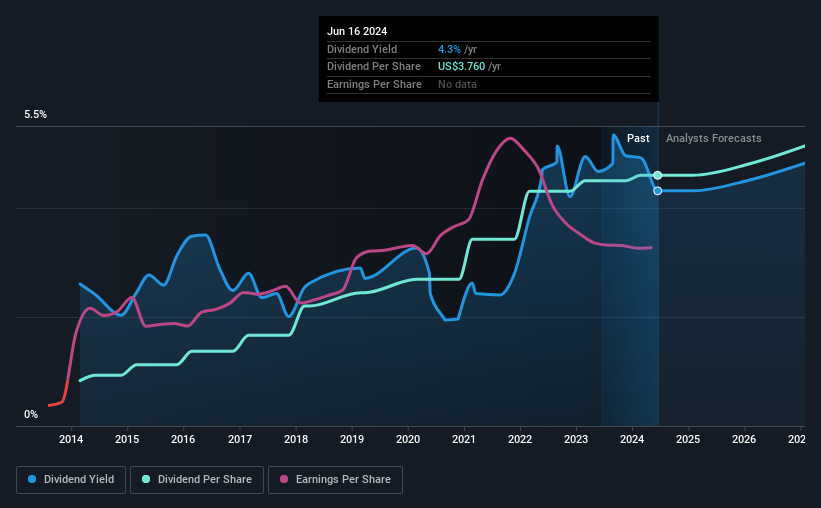- United States
- /
- Specialty Stores
- /
- NYSE:BBY
Interested In Best Buy's (NYSE:BBY) Upcoming US$0.94 Dividend? You Have Three Days Left

Best Buy Co., Inc. (NYSE:BBY) stock is about to trade ex-dividend in three days. The ex-dividend date is one business day before the record date, which is the cut-off date for shareholders to be present on the company's books to be eligible for a dividend payment. The ex-dividend date is important as the process of settlement involves two full business days. So if you miss that date, you would not show up on the company's books on the record date. Accordingly, Best Buy investors that purchase the stock on or after the 20th of June will not receive the dividend, which will be paid on the 11th of July.
The company's next dividend payment will be US$0.94 per share. Last year, in total, the company distributed US$3.76 to shareholders. Last year's total dividend payments show that Best Buy has a trailing yield of 4.3% on the current share price of US$87.21. If you buy this business for its dividend, you should have an idea of whether Best Buy's dividend is reliable and sustainable. So we need to investigate whether Best Buy can afford its dividend, and if the dividend could grow.
View our latest analysis for Best Buy
If a company pays out more in dividends than it earned, then the dividend might become unsustainable - hardly an ideal situation. Best Buy paid out more than half (65%) of its earnings last year, which is a regular payout ratio for most companies. Yet cash flows are even more important than profits for assessing a dividend, so we need to see if the company generated enough cash to pay its distribution. Dividends consumed 66% of the company's free cash flow last year, which is within a normal range for most dividend-paying organisations.
It's encouraging to see that the dividend is covered by both profit and cash flow. This generally suggests the dividend is sustainable, as long as earnings don't drop precipitously.
Click here to see the company's payout ratio, plus analyst estimates of its future dividends.

Have Earnings And Dividends Been Growing?
Stocks with flat earnings can still be attractive dividend payers, but it is important to be more conservative with your approach and demand a greater margin for safety when it comes to dividend sustainability. If business enters a downturn and the dividend is cut, the company could see its value fall precipitously. It's not encouraging to see that Best Buy's earnings are effectively flat over the past five years. It's better than seeing them drop, certainly, but over the long term, all of the best dividend stocks are able to meaningfully grow their earnings per share. Earnings per share growth has been slim, and the company is already paying out a majority of its earnings. While there is some room to both increase the payout ratio and reinvest in the business, generally the higher a payout ratio goes, the lower a company's prospects for future growth.
The main way most investors will assess a company's dividend prospects is by checking the historical rate of dividend growth. Best Buy has delivered 19% dividend growth per year on average over the past 10 years.
Final Takeaway
Is Best Buy an attractive dividend stock, or better left on the shelf? Best Buy has struggled to grow its earnings per share, and while the company is paying out a majority of its earnings and cash flow in the form of dividends, the dividend payments don't appear unsustainable. Overall, it's not a bad combination, but we feel that there are likely more attractive dividend prospects out there.
However if you're still interested in Best Buy as a potential investment, you should definitely consider some of the risks involved with Best Buy. Case in point: We've spotted 1 warning sign for Best Buy you should be aware of.
Generally, we wouldn't recommend just buying the first dividend stock you see. Here's a curated list of interesting stocks that are strong dividend payers.
Valuation is complex, but we're here to simplify it.
Discover if Best Buy might be undervalued or overvalued with our detailed analysis, featuring fair value estimates, potential risks, dividends, insider trades, and its financial condition.
Access Free AnalysisHave feedback on this article? Concerned about the content? Get in touch with us directly. Alternatively, email editorial-team (at) simplywallst.com.
This article by Simply Wall St is general in nature. We provide commentary based on historical data and analyst forecasts only using an unbiased methodology and our articles are not intended to be financial advice. It does not constitute a recommendation to buy or sell any stock, and does not take account of your objectives, or your financial situation. We aim to bring you long-term focused analysis driven by fundamental data. Note that our analysis may not factor in the latest price-sensitive company announcements or qualitative material. Simply Wall St has no position in any stocks mentioned.
Have feedback on this article? Concerned about the content? Get in touch with us directly. Alternatively, email editorial-team@simplywallst.com
About NYSE:BBY
Best Buy
Offers technology products and solutions in the United States, Canada, and internationally.
6 star dividend payer with excellent balance sheet.
Similar Companies
Market Insights
Community Narratives



